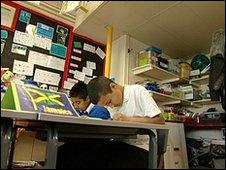Sats boycott hits tens of thousands of pupils
- Published

The test results make up the league tables
Tens of thousands of children in England are missing their Sats tests as head teachers in hundreds of schools stage a boycott.
About 600,000 10 and 11-year-olds were due to take the national schools tests from Monday.
But heads and deputies from two big teaching unions voted for a boycott.
BBC News contacted England's councils and found that - among the 113 which had responded by Monday morning - 15% of schools were not doing the tests.
The councils which took part cover 73% of England's 17,000 primary schools.
Of those the schools covered in the snapshot survey, nearly 1,900 (15%) said they were boycotting the tests and about 5,650 said they were not (45%).
How the boycott is affecting schools across the country., external
The councils say they do not know the situation in the remaining 40% of schools.
The tests, in maths and English, are only taken in England with the results being used to make up the primary school league tables.
Support for the boycott across the country is patchy, varying from areas such as Bedford and Bournemouth, where the councils say all schools are running the tests - to Hartlepool, where all 31 primaries are said to be boycotting.
In Manchester and Birmingham, the councils say half of schools are staging a boycott.
'Patchy'
Many head teachers say that the tests damage children's education because they encourage teachers to "teach to the test", so that other subjects are squeezed out of the curriculum.
And the league tables, they say, humiliate schools and do not show what they and their pupils really achieve.
The industrial action is being taken by the National Association of Head Teachers and heads and deputies in the National Union of Teachers but members are free to stage the action or not.
Mick Brookes, the general secretary of the NAHT, said it was wrong that a whole school should be held to account by a set of tests taken by one year-group.
"Of course schools need to be held to account. But they need to be held to account for what every child is doing in the school and the breadth of the curriculum, not just narrowing it down to English and maths."
He later conceded that many heads had not backed the action, suggesting they might have felt vulnerable as they were the one person in the workplace taking the action
"Add to that threats from the Secretary of State and this sense of not wanting to break the rules - I can understand why a lot of people are saying we want to go ahead today," he added.
Moral duty
NUT general secretary Christine Blower said the boycott would make "the annual ritual of naming and shaming schools through league tables impossible".
She added: "It is essential that government listens to and engages with the profession in constructive talks about reforming assessment at primary level.
At some schools, such as Montrose School in Leicester, heads have opted to get children to sit last year's Sats tests and will pass the information on to parents.
Its head teacher Sandra Sutcliffe said: "Our school does very well in the tests but I hope this will raise a dialogue about whether a 45-minute exam is the best way to make conclusions about six years of work in primary schools.
"The curriculum has become very distorted and some of our children are losing their sparkle and interest."
This industrial action will be one of the first issues facing the person responsible for education in a new government.
Labour's Schools Secretary Ed Balls had urged the heads not to take the action, warning them that they would be in breach of both moral and statutory duties to hold the tests.
But parents seem divided on the boycott.
The co-founder of the Netmums website, Siobhan Freegard, had said it was too late to stage a boycott, because of all the hard work children had done to prepare for them.
In the run-up to the election, both the Conservatives and the Liberal Democrats said they were against the boycott but that they planned to reform Sats.
The Liberal Democrats said they would put more emphasis on classroom assessments by teachers.